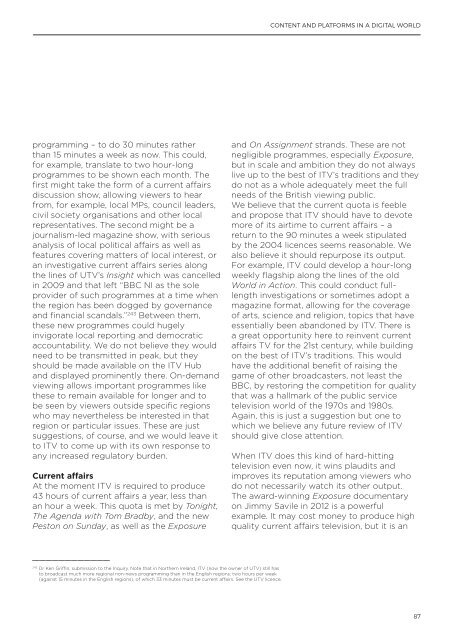A FUTURE FOR PUBLIC SERVICE TELEVISION CONTENT AND PLATFORMS IN A DIGITAL WORLD
FOTV-Report-Online-SP
FOTV-Report-Online-SP
Create successful ePaper yourself
Turn your PDF publications into a flip-book with our unique Google optimized e-Paper software.
<strong>CONTENT</strong> <strong>AND</strong> PLAT<strong>FOR</strong>MS <strong>IN</strong> A <strong>DIGITAL</strong> <strong>WORLD</strong><br />
programming – to do 30 minutes rather<br />
than 15 minutes a week as now. This could,<br />
for example, translate to two hour-long<br />
programmes to be shown each month. The<br />
first might take the form of a current affairs<br />
discussion show, allowing viewers to hear<br />
from, for example, local MPs, council leaders,<br />
civil society organisations and other local<br />
representatives. The second might be a<br />
journalism-led magazine show, with serious<br />
analysis of local political affairs as well as<br />
features covering matters of local interest, or<br />
an investigative current affairs series along<br />
the lines of UTV’s Insight which was cancelled<br />
in 2009 and that left “BBC NI as the sole<br />
provider of such programmes at a time when<br />
the region has been dogged by governance<br />
and financial scandals.” 243 Between them,<br />
these new programmes could hugely<br />
invigorate local reporting and democratic<br />
accountability. We do not believe they would<br />
need to be transmitted in peak, but they<br />
should be made available on the ITV Hub<br />
and displayed prominently there. On-demand<br />
viewing allows important programmes like<br />
these to remain available for longer and to<br />
be seen by viewers outside specific regions<br />
who may nevertheless be interested in that<br />
region or particular issues. These are just<br />
suggestions, of course, and we would leave it<br />
to ITV to come up with its own response to<br />
any increased regulatory burden.<br />
Current affairs<br />
At the moment ITV is required to produce<br />
43 hours of current affairs a year, less than<br />
an hour a week. This quota is met by Tonight,<br />
The Agenda with Tom Bradby, and the new<br />
Peston on Sunday, as well as the Exposure<br />
and On Assignment strands. These are not<br />
negligible programmes, especially Exposure,<br />
but in scale and ambition they do not always<br />
live up to the best of ITV’s traditions and they<br />
do not as a whole adequately meet the full<br />
needs of the British viewing public.<br />
We believe that the current quota is feeble<br />
and propose that ITV should have to devote<br />
more of its airtime to current affairs – a<br />
return to the 90 minutes a week stipulated<br />
by the 2004 licences seems reasonable. We<br />
also believe it should repurpose its output.<br />
For example, ITV could develop a hour-long<br />
weekly flagship along the lines of the old<br />
World in Action. This could conduct fulllength<br />
investigations or sometimes adopt a<br />
magazine format, allowing for the coverage<br />
of arts, science and religion, topics that have<br />
essentially been abandoned by ITV. There is<br />
a great opportunity here to reinvent current<br />
affairs TV for the 21st century, while building<br />
on the best of ITV’s traditions. This would<br />
have the additional benefit of raising the<br />
game of other broadcasters, not least the<br />
BBC, by restoring the competition for quality<br />
that was a hallmark of the public service<br />
television world of the 1970s and 1980s.<br />
Again, this is just a suggestion but one to<br />
which we believe any future review of ITV<br />
should give close attention.<br />
When ITV does this kind of hard-hitting<br />
television even now, it wins plaudits and<br />
improves its reputation among viewers who<br />
do not necessarily watch its other output.<br />
The award-winning Exposure documentary<br />
on Jimmy Savile in 2012 is a powerful<br />
example. It may cost money to produce high<br />
quality current affairs television, but it is an<br />
243<br />
Dr Ken Griffin, submission to the Inquiry. Note that in Northern Ireland, ITV (now the owner of UTV) still has<br />
to broadcast much more regional non-news programming than in the English regions: two hours per week<br />
(against 15 minutes in the English regions), of which 33 minutes must be current affairs. See the UTV licence.<br />
87


